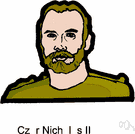tsar
(redirected from Tsardom)Also found in: Thesaurus, Encyclopedia.
tsar
(zär, tsär)n.
Variant of czar.. See Usage Note at czar.
American Heritage® Dictionary of the English Language, Fifth Edition. Copyright © 2016 by Houghton Mifflin Harcourt Publishing Company. Published by Houghton Mifflin Harcourt Publishing Company. All rights reserved.
tsar
(zɑː; tsɑː) orczar
n
Also (less commonly): tzar 1. (Historical Terms) (until 1917) the emperor of Russia
2. a tyrant; autocrat
3. (Government, Politics & Diplomacy) informal a public official charged with responsibility for dealing with a certain problem or issue: a drugs tsar.
4. informal a person in authority; leader
5. (Historical Terms) (formerly) any of several S Slavonic rulers, such as any of the princes of Serbia in the 14th century
[from Russian tsar, via Gothic kaisar from Latin Caesar]
ˈtsardom, ˈczardom n
Collins English Dictionary – Complete and Unabridged, 12th Edition 2014 © HarperCollins Publishers 1991, 1994, 1998, 2000, 2003, 2006, 2007, 2009, 2011, 2014
czar
or tsar
(zɑr, tsɑr)n.
1. an emperor or king.
2. (often cap.) the former emperor of Russia.
3. an autocratic ruler or leader.
4. any person exercising great authority or power: a czar of industry.
[1545–55; < Russian tsar', Old Russian tsĭsarĭ emperor, king (akin to Old Church Slavonic tsěsarĭ) < Gothic kaisar emperor (< Greek or Latin); Greek kaîsar < Latin Caesar Caesar]
czar′dom, n.
Random House Kernerman Webster's College Dictionary, © 2010 K Dictionaries Ltd. Copyright 2005, 1997, 1991 by Random House, Inc. All rights reserved.
ThesaurusAntonymsRelated WordsSynonymsLegend:
Switch to new thesaurus
| Noun | 1. |  tsar - a male monarch or emperor (especially of Russia prior to 1917) tsar - a male monarch or emperor (especially of Russia prior to 1917)Russia - a former empire in eastern Europe and northern Asia created in the 14th century with Moscow as the capital; powerful in the 17th and 18th centuries under Peter the Great and Catherine the Great when Saint Petersburg was the capital; overthrown by revolution in 1917 |
Based on WordNet 3.0, Farlex clipart collection. © 2003-2012 Princeton University, Farlex Inc.
tsar
czarnoun
1. ruler, leader, emperor, sovereign, tyrant, despot, overlord, autocrat Princess Anne is related to the Tsar of Russia.
2. (Informal) head, chief, boss, big cheese (informal), baas (S. African), head honcho (informal) He was appointed 'drugs tsar' by Bill Clinton.
Collins Thesaurus of the English Language – Complete and Unabridged 2nd Edition. 2002 © HarperCollins Publishers 1995, 2002
Translations
car
zar
cár
tsar, keisari
caras
cars
cár
Collins Spanish Dictionary - Complete and Unabridged 8th Edition 2005 © William Collins Sons & Co. Ltd. 1971, 1988 © HarperCollins Publishers 1992, 1993, 1996, 1997, 2000, 2003, 2005
tsar
tzar, czar [ˈzɑːr] n (formerly, in Russia) → tsar m
(person in charge of dealing with problem) drug tsar → haut(e) responsable mf de la lutte contre la drogue
AIDS tsar → haut(e) responsable mf de la lutte contre le sida
AIDS tsar → haut(e) responsable mf de la lutte contre le sida
Collins English/French Electronic Resource. © HarperCollins Publishers 2005
tsar
n → Zar m
Collins German Dictionary – Complete and Unabridged 7th Edition 2005. © William Collins Sons & Co. Ltd. 1980 © HarperCollins Publishers 1991, 1997, 1999, 2004, 2005, 2007
Collins Italian Dictionary 1st Edition © HarperCollins Publishers 1995
tsar,
czar,
tzar
(zaː) noun (the status of) any of the former emperors of Russia. He was crowned tsar; Tsar Nicholas.
Kernerman English Multilingual Dictionary © 2006-2013 K Dictionaries Ltd.